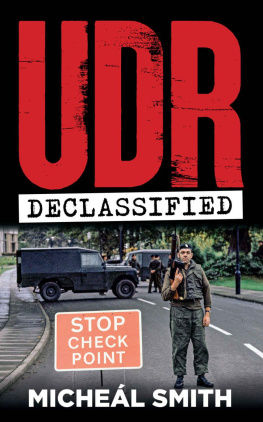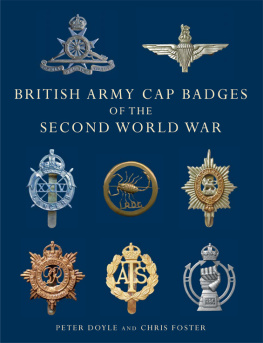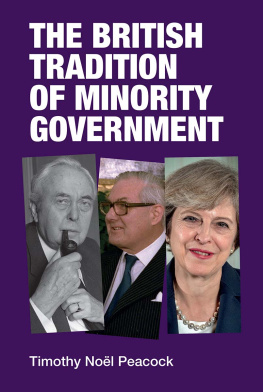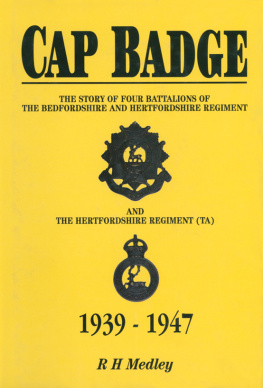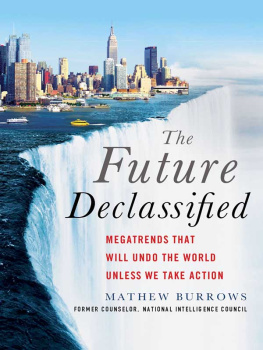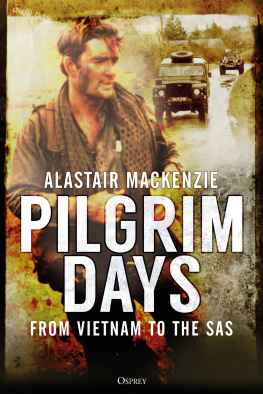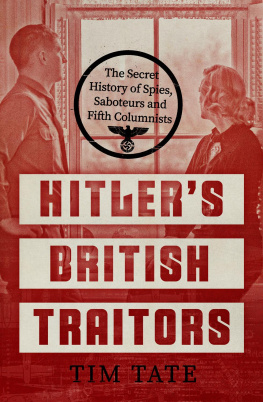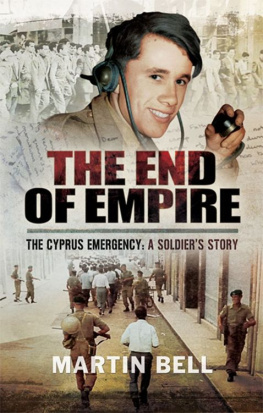

Michel Smith is an advocacy case worker with the Pat Finucane Centre. He had previously worked as a diplomat with Irelands Department of Foreign Affairs and Trade, and was privileged to work as Irish government observer and a liaison for the families at the Bloody Sunday Inquiry in Derry and London. He lives in Belfast with his wife and three stepchildren.

First published in 2022 by
Merrion Press
10 Georges Street
Newbridge
Co. Kildare
Ireland
www.merrionpress.ie
Michel Smith, 2022
9781785374272 (Paper)
9781785374289 (Ebook)
A CIP catalogue record for this book is available from the British Library.
All rights reserved. No part of this publication may be reproduced, stored in a retrieval system, or transmitted, in any form or by any means (electronic, mechanical, photocopying, recording or otherwise), without the prior written permission of both the copyright owner and the publisher of this book.
Typeset in Sabon LT Std 11/15 pt
Cover design by Fiachra McCarthy
Front cover image: UDR vehicle checkpoint, Belfast, Northern Ireland, 1971. Image courtesy of Victor Patterson, Belfast, UK.
Merrion Press is a member of Publishing Ireland.
CONTENTS
ACKNOWLEDGEMENTS
T his book could not possibly have been completed without the assistance and guidance of my colleagues at the Pat Finucane Centre (PFC) and Justice for the Forgotten (JFF). Adrienne Reilly, Alan Brecknell, Anne Cadwallader, Margaret Urwin, Paul OConnor and Sara Duddy each dove deep into the archives, as did intern Ulrike Hillerku from NUI Galway. I have been very fortunate indeed to have worked with such fantastic colleagues and friends.
The book includes many written contributions throughout by my PFC/JFF colleagues. Margaret Urwin gave great assistance with the sections on the Miami Showband killings, and on the attacks on Belturbet and Pettigo, while Anne Cadwallader, lent her talents for the section on weapon UF57A30490.
I also relied upon previously published works, including Paul OConnor and Alan Brecknells article British Counter-Insurgency Practice in Northern Ireland in the 1970s A Legitimate Response or State Terror? and the Pat Finucane Centre pamphlet The Hidden History of the UDR: The Secret Files Revealed . Both documents disclosed the stunning extent of collusion between the UDR and loyalist paramilitaries, the penetration of that regiment by loyalist paramilitaries, and the extent to which all of this was known about, tolerated and encouraged by Whitehall and the MoD.
I have been aided in compiling this research by the work of many others, and there is hardly space to acknowledge them all here. Nevertheless, deserving of special mention are journalist and researcher Tom Griffin, Ciarn MacAirt (of Papertrail.pro ) and Alec Ward (of the University of Virginia), who were particularly generous with their time and research, and Orla Smith, who kindly provided her time and the mysterious arts of transcription and speed-typing.
I am especially grateful to my wife, Sharon McDaid, and our children, Tara, Michael and Ryan, for their constant love and support. Thank you also to the Smith and McDaid families, especially Deirdre, Orla, Seamus and Geraldine.
Thanks to Conor Graham, Patrick ODonoghue, Maeve Convery, Wendy Logue and all at IAP/Merrion Press for guiding me through the process of turning a pile of words into a book, and to the editors who left me humbled by the thoroughness of the deep clean done to my text.
Many thanks are owed to Colin Wallace who generously provided a foreword for this book. As a former member of the Ulster Special Constabulary, a Captain in the Ulster Defence Regiment, and a senior Psychological Operations Officer at Army Headquarters in Northern Ireland from 1970 to 1975, Mr Wallaces thoughts on the books subject matter gave a complementary perspective which it was important to present.
Finally, I am grateful to the many families fighting for justice whom I have met as an advocacy case worker with the Pat Finucane Centre. Your spirit, courage and endurance through every challenge has been constantly inspirational. I have been privileged to share in your victories and honoured to gather strength from you whenever we have faced defeat. This book is dedicated to you.
Michel Smith
FOREWORD
C OLIN W ALLACE ,
FORMER SENIOR P SYCHOLOGICAL O PERATIONS
O FFICER , A RMY H EADQUARTERS
Before you judge my life, my past or my character, walk in my shoes, walk the path I have travelled, live my sorrow, my doubts, my fear, my pain and my laughter. Remember, everyone has a story of their own. When youve lived my life, then you can judge me
ANONYMOUS
T his is an important but, for many, a potentially painful book. It highlights that, to walk in another persons shoes, we need to shift our own perspective on occasions to see and feel the world as another person sees and feels it. In particular, it is about making a genuine effort to grasp the other persons point of view emotionally. Once we understand that our own hitherto apparent truth is only one perspective, it allows us to view the same situation differently. Such a shift in perception is the foundation of empathy and is of immeasurable help in resolving conflicts, as South Africas truth and reconciliation process has shown. Our perception is our reality and, if our perception is flawed, our reality also becomes flawed.
My parents were both born in Scotland, but I was born and grew up in Northern Ireland where my grandparents lived. My father had been shot and severely wounded serving with the British army in France in the First World War. He survived, but died while serving with the Royal Air Force in the Second World War. Another family member was killed in the First World War during the battle for Vimy Ridge. I suppose my family background isolated me, to some extent, from the more extreme sectarian undercurrents that brought havoc to so many lives in Ireland over the years.
As one would expect, I am not a natural critic of the security forces who served honourably in Northern Ireland. I am, however, unashamedly a critic of those individuals who abused their positions within the security agencies and undermined the good work done by those who genuinely tried to bring about peace to that community. Ireland as a whole was, and remains, one of the most hospitable and friendly places on earth, but it has also been a place of unimaginable cruelty.
In his report of the Dublin and Monaghan bombings, Judge Henry Barron summed up my attitude to my role in Northern Ireland as follows:
Though he has reasons enough to be bitter the abrupt and unjust ending of a promising career in Northern Ireland, five years spent in prison on a conviction which has since been quashed he displays no outward signs of resentment towards individuals or institutions. He remains intensely loyal to his country and to the Army: insofar as he has a quarrel, it is with individuals rather than the institutions concerned When speaking of matters directly within his own experience, the Inquiry believes him to be a highly knowledgeable witness.
When the British army deployed in Northern Ireland on peacekeeping duties in 1969, I was already working as an information officer on the staff of the British armys HQ on the outskirts of Belfast. By 1971, I had become a member of the armys Psychological Operations (PsyOps) unit. My work required me to walk in the shoes of the paramilitaries involved in the conflict to achieve a better perspective on their activities and motivations, and to use that perspective to disrupt their operations.
Next page
